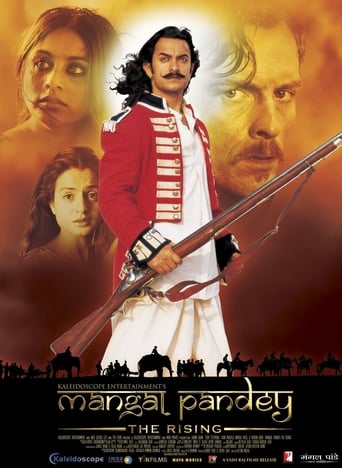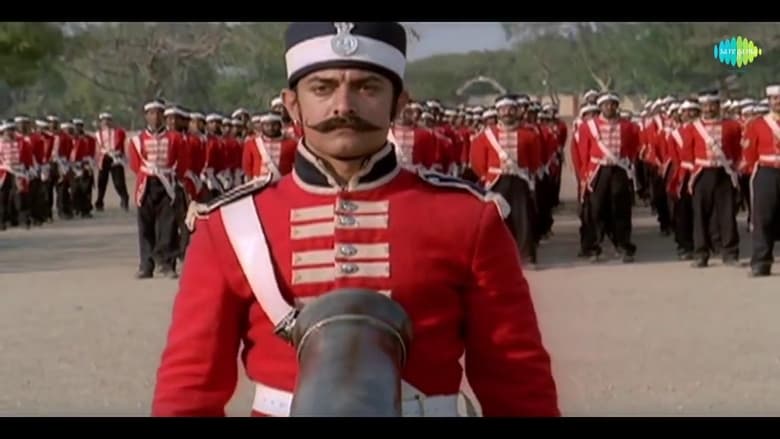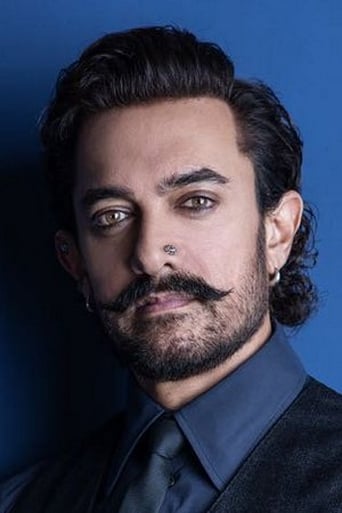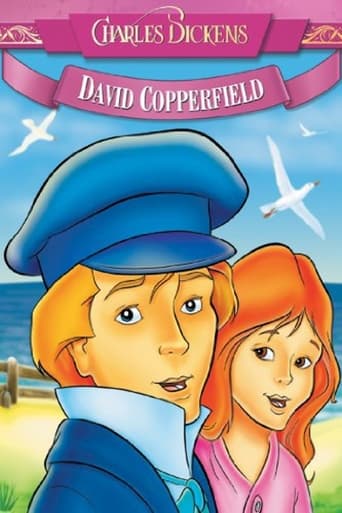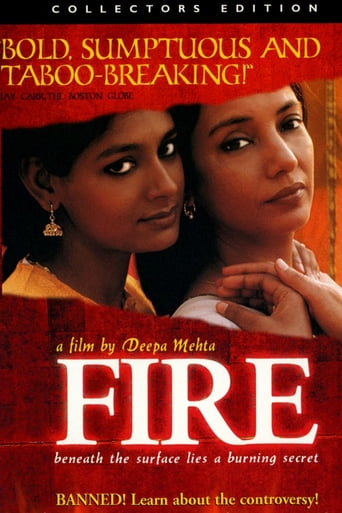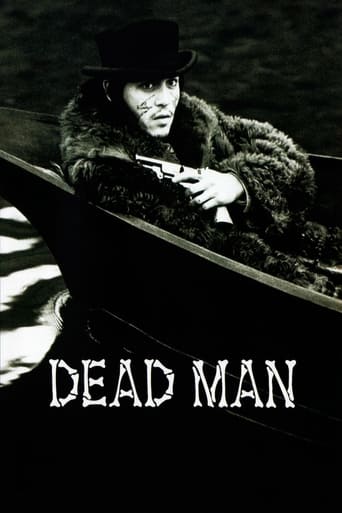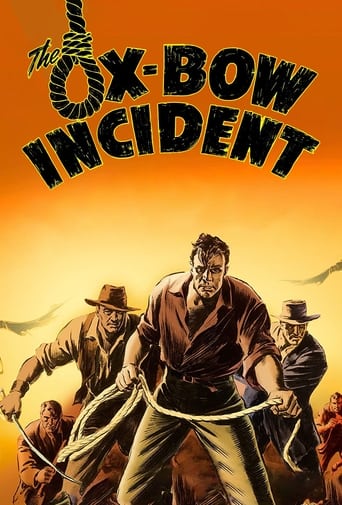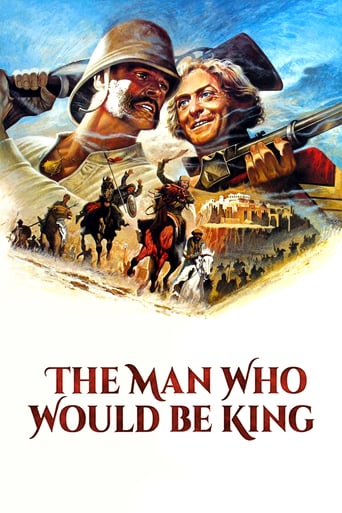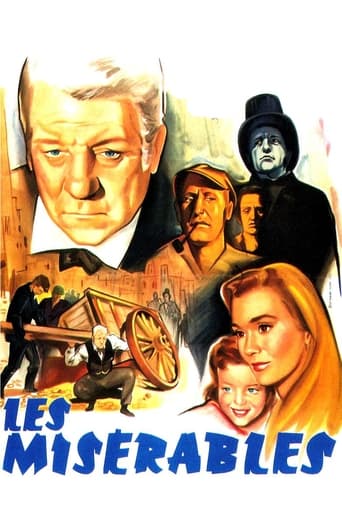Mangal Pandey - The Rising (2005)
The film begins in 1857, when India was ruled by the British East India Company. Mangal Pandey is a sepoy, a soldier of Indian origin, in the army of the East India Company. Pandey is fighting in the Anglo-Afghan Wars and saves the life of his British commanding officer, William Gordon. Gordon is indebted to Pandey and a strong friendship develops between them, transcending both rank and race.
Watch Trailer
Cast


Similar titles
Reviews
I started watching this film on television, having no idea what it was about. In common with almost all Indian films it contains several song and dance sequences that have little to do with advancing the plot. The scenery is quite pretty and some of the buildings used as locations are beautiful (although a little out-of-period in look). It starts with a flash-forward to near the ending of the story, and we see preparations made to execute a prisoner. He is a handsome muscular dignified magnificent specimen, so he has "hero" written all over him.It then became clear what the film was about: the 1857 Indian Mutiny. The simple fact is that most people seeing this will not know the details of what actually happened and will accept much of what is shown as history. Of course they will know that specifics of dialogue and so forth are invented, but the emotional impact of the message of the story has power, and so there is a responsibility on the film makers to use this power wisely and fairly.The film then commits several terrible acts of inaccuracy. I will concentrate on one: a rumour is spread that pig and cow grease are used on the cartridges issued to troops, and this displeases the Hindus (cows) and Muslims (pigs). It is historically true that the RUMOUR of this existed and contributed to the starting of the Mutiny, but the film then goes on to tell the audience that the rumour was true. In historical reality it really was just a rumour. The cartridges were waxed. Hollywood and Bollywood seem very comfortable with portraying the British as incompetent and evil and here we see this lazy scripting at work again. The East India Company did make a big mistake in not taking the rumour seriously, but it was not so stupid or so evil as to actually use pig or cow grease on the cartridges.H/Bollywood might be forgiven for a certain amount of artistic convention with characters etc. (in this film, the lead characters in the story also happen to be best friends, having saved each other's lives in the past etc.), but it really should not take liberties to the point when the story is just a lie, nor should it, as here, make political points at the end of the film, dressed up as history. The film ends with a statement that Mangal Pandey as portrayed was a real man (the real man was very ordinary and claimed in court to have been under the influence of drugs when he did what he did), and that the Mutiny was really the first war of Indian independence, throwing off the yolk of subjugation and exchanging this for happy freedom. Historians will differ in their interpretations and emphases of the past, but it must be pointed out that the East India Company ruled India as a far more prosperous, advanced, just, and peaceful place that it had found it. Also, the instant that India gained its dependence, it was rent into parts, with Pakistan and what later became Bangladesh splitting away, and a tremendously bloody civil war flared up in which vastly more Indians died than did at the hands of the British, and more people were displaced than at any other time in history.I am sick of one lot of rulers replacing another lot's being shown as "freedom" in films. "Braveheart" did the same - I am unconvinced that the Scots fighting for the "freedom" to be subjugated by a slightly different set of feudal lords really did themselves much good.There are so many interesting themes in human interaction and history to be explored. It is a shame that films like this always tell the same few tales over and over, and reduce everything to a few stereotypes. The Indian Mutiny would make a good setting for a film exploring the nature of good rule, the power of rumour, the importance of religious tolerance, the randomness of historical events, but instead we get the standard farm-boy becomes hero, kills black knight, rescues maiden, fights the Evil Empire story. This works in Star Wars largely because Star Wars is so self-consciously legend. In the setting of historical events that still today have political implications, it is pernicious.The film looks good, has reasonably decent performances in it, and a few scenes with lots of costumed extras, but it is far too long, too familiar and low-brow. The heroic British officer in the court room scene is made to rant and yell for the sake of drama. How much more powerful and fair the scene would have been if he had spoken calmly. History records that after the mutiny, the trials held were very fair and threw out most charges of rape that were reported against white British. There was no savage retribution - quite the reverse. That is another interesting story here ignored.
A commendable effort when someone decides to document an important chapter in history and bring forth to patrons of 'cinema of substance' Aamir Khan in and as Mangal Pandey. But the director Ketan Mehta has only managed to scrape the dust off the episode in history, ravaged by time and failed to extract its vibrancy that would emulate the similar desire and passion in those watching it. Neither does the film keeps you on the edge of the seat where you let the warm squall of adrenalin sweep over the thousand thoughts bombarding the mind. Some of them being, why is the film following the same pace from beginning to end or why am I not getting charged? I love my country and I want to do something for my country, like for the record there was a recruit for Kargil war after the young boy fresh from college watched J.P. Dutta's Border. Why is Mangal Pandey not telling me to take some action or even do an honest introspection? Whose fault is it? Certainly, the flaw lies in the insipid direction. In the past, films like Shaheed, Kranti or even Raj Kumar Santoshi's Bhagat Singh have scored better when it comes to audience empathy. Any accosting to the director will have to be half guarded because of the vagaries that are like eye-sores including female characters, which tip from crude to unconvincing, average music and poor screenplay among other things. Films like Lagaan was not a one-man show and bigger than Aamir Khan as the actor. All characters etched out properly, like in the cricket team even when you have your favorites in Sachin Tendulkar, you would also care when Harbhajan throws a googly or when Yuvraj comes in for a fantastic cameo inning. But like Mangal Pandey in history who was passionate and overzealous and took the cause of struggle for freedom on his shoulders, in the film, Aamir Khan the actor consciously or subconsciously projects himself as the last man standing. What Shahrukh couldn't do for Swades, Aamir does for Mangal Pandey. The gamble pays off because the film despite a shaky structure and narrative will be a crowd puller thanks to the long exile of Aamir Khan and his reputation of being the perfectionist and the untouchable, but the truth the film lacks the soul and an ability to stir any sentiments of patriotism or even connect the audience on an emotional level. The Story-Mangal Pandey (Aamir Khan) is one of the many sepoys of the 5th Company, 34th Native Infantry Regiment, Barrackpore. Loyal to his superiors in the army of British East India Company, Mangal Pandey is the man with exceptional skills and bravery; and has also befriended an officer called William Gordon (Toby Stephens). Toby Stephens performed his part of an officer pulled between his white man's burden and friendship and empathy for Mangal Pandey and his cause, delivers a powerful, credible and sensitive performance. On learning that the new cartridges are greased with animal fat, a widespread resentment breaks amongst Indian soldiers fostering Hindu-Muslim sentiments. Mangal Pandey leads the mutiny and turns it into the first war of independence, becoming the first rebel and first martyr in history. There are two love stories in the film, one between Gordon and Jwala; (Ameesha Patel) a Sati he rescues and the other between Mangal and Heera; (Rani Mukerji) a prostitute. Both Ameesha and Rani played their parts with desired vulnerability and passion. Aamir Khan did justice to his role and as reiterated, indeed is the last man standing in the film.
Plot Outline: Set in 1957 British India, Mangal Pandey (Aamir) a Sepoy in the East India Company saves Capt William Gordon's life thus earning his friendship cutting across race and rank. Things get worse when Company introduces a new Cartridge allegedly greased with Cow and Pig fat, hurting both Hindu and Muslim sentiments. Mangal Pandey's reaction and the start of the Sepoy Mutiny is a known piece from History. Other characters include Prostitute Heera (Rani) and a rescued Sati victim Jwala (Ameesha) Comment: Mangal Pandey, in the movie has been projected as the Forerunner of India's freedom struggle and one who was chivalrous with prostitutes. While people from the Hero's village have reportedly disagreed to him being portrayed as a drunkard and man who visited prostitutes, the British don't seem to have liked their portrayal as being brutal.Some historians call Mangal an accidental hero; a casteist man facing societal rejection of having bitten Cow/Pig fat-greased cartridge reacted against the British, thus forcibly triggering the revolt much earlier than it was planned. Mangal's casteist notions are visible when Heera tries to touch him and he asks her 'What Caste are you?' There are many who say that Mangal, an obedient Sepoy of the company reacted more out of religious sentiments than out of any patriotic fervor. Surely, Ketan Mehta could have could have learnt how to make History Films from Hollywood's Braveheart.Ketan Mehta of Holi & Mirch Masala fame claims to have research two years on this subject. I can't believe that he has turned up with such a poor script after all those years. The best 'actors' of Bollywood Aamir & Rani have been thoroughly wasted with half baked poorly researched roles. Toby Stephens better known as the villain in the 007 flick Die Another Day is the only one to have a well scripted role and has done exceedingly well. His dialogue delivery in Hindi and his dedicated performance are noteworthy.Music is average with ill timed songs disturbing the pace of the movie. The Holi song is the most misplaced of all. Rahman has done a Mediocre job on this movie with 'Mangala Mangala' and 'Vari Vari' being the creamier of the lot.Rating: 3/5
I am amazed at the negative comments about this film, especially from India. I'll address those criticisms later after providing a summary of the film.Set in 1857, the film tells the story of Mangal Pandey, a sepoy (private) in the 34th Native Infantry regiment of the Bengal Army (the army of the Presidency of Bengal, governed by the British East India Company and recruited largely from upper caste UP and Bihar stock). Mangal is depicted as an ordinary soldier who is offended by the introduction of the new Enfield rifle cartridges which were greased with pig and cow fat (the former anathema to Muslims and the latter sacred to Hindus). The movie shows him changing from a loyal Company sepoy who saved a British officer's life, to one who ends up questioning the logic of British rule. Other themes include his friendship with the same British officer, the officer's rescue and subsequent romantic relationship with a sati - a widow expected to burn herself on her husband's funeral pyre,and a prostitute who exclusively services the English brothels but falls for Pandey. The movie brings opium cultivation, corruption within the Company, the growing distance between English and Indians, as well as backward, traditional Indian attitudes into sharp focus.All in all, the film is highly entertaining, a good story - well told, with powerful performances by the main characters. Aamir Khan is in his element, living the character of Pandey and conveying a fantastic portrayal of the soldier who realizes, bit by bit, that his loyalty to a foreign army makes him as "untouchable" as the low-caste man or prostitutes he scorns. Toby Stephens performance as the outsider in British India (Scottish, poor schooling, too fraternal with the natives) was brilliant and his chemistry with Khan was the high mark of the film's dramatic impact. The music by AR Rahman is louder than usual and some of the beats are frankly out of sync with the times ( the lesbianish gypsy dance number was a bit much!!).The strength of the film was in conveying a sense of the time period - costumes,hair-styles, sets, manners ( the English officer's "Koi Hai"), were exactly what one could expect. The historical background was fairly accurate (sati was outlawed, opium cultivation was forced, the Company was beset by corruption, the English did have European only brothels) though the exact interpretation of events may have not been supported by history.Which brings me to the criticism of the film. these seem to be of two variants - one, the film was not entertaining enough, and two, the anguished howl of the historians who decry its historical illegitimacy in the hope that no one may turn nationalist by seeing this film.I will dismiss the first criticism, since that may be a matter of taste - certainly, desi (Indian) audiences raised on simpler story lines and poorer production values (see Asoka and n number of Indian period dramas) may find The Rising a bit heavy to digest.Historically, the film may be inaccurate in the sense that Mangal Pandey may not have been the nationalist as portrayed, the relationships with the English officer and the prostitute are probably fictitious. But are they impossible? NO. The film has a paragraph disclaimer about inaccuracy at the beginning but this does not satisfy the history lobby. Why is it not possible that the official version about Pandey - that he was under the influence of bhang ( a hallucinogen) when he shot and killed an officer and then tried to shoot himself - is dressed up to cover the Company's stupidity in introducing the greased cartridges? Its not as if such "doctoring" of history has not taken place - witness the designations of "Mutiny" on the British side and "First War of Indian Independence" on the Indian side - when it was something in between? Secondly, why is The Rising being targeted when virtually every Indian film plays merry with historical events and characters? Akbar and Salim did not go to war over a dancing girl (Mughal-e-Azam), Shah Jahan was not the devoted son depictd in Taj Mahal but an ambitious usurper, one hopes that Ashoka was not the ghastly caricature depicted in Shahrukh Khan's film, and certainly India was not administered by ARMY officers as shown in Lagaan b ut by a civil ICS administration.Similarly, Hollywood glosses over the fact that getting the German Enigma machines in WW2 was a purely British affair (U-571 shows us otherwise), and of course America won the war (no mention of UK/Common wealth forces, or more importantly - Soviet forces).What I am saying is that films always distort history a bit - and so long as they are not conveying a completely different story - that should not matter. A purist on the matter of history myself, I am surprised by the vehemence of the historical community's attack on the film. My guess is that they do not want a false sense of nationalism to emerge on the basis of the Mangal Pandey story. They are a hundred and fifty years late in stopping the myth from taking hold.In the end The Rising is a great film, a great story, well shot, with a few excusable omissions.

